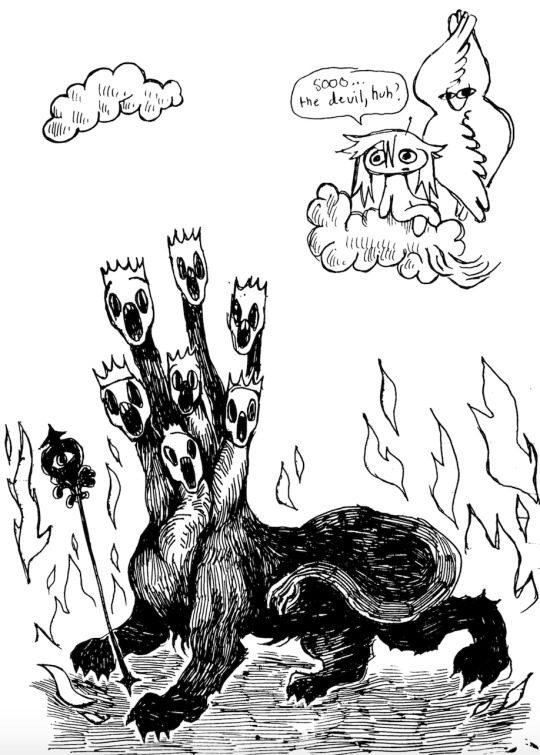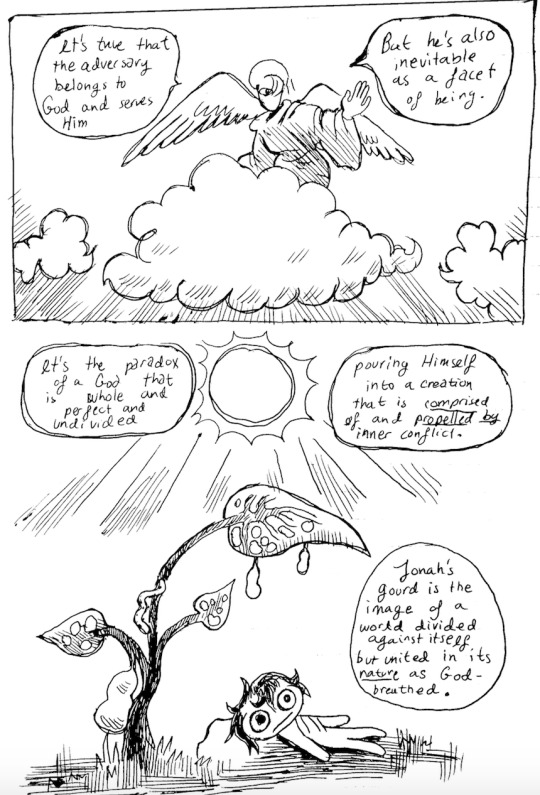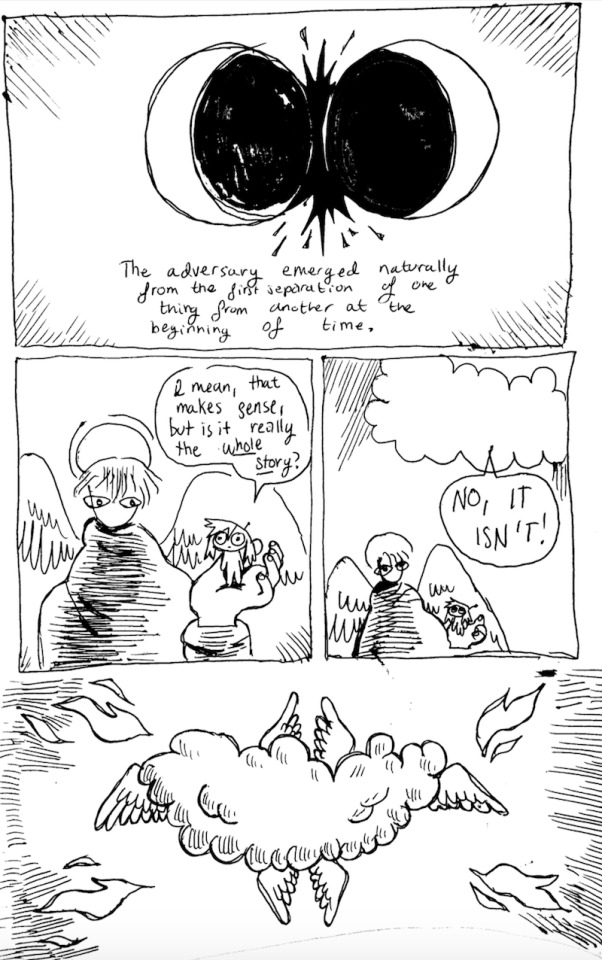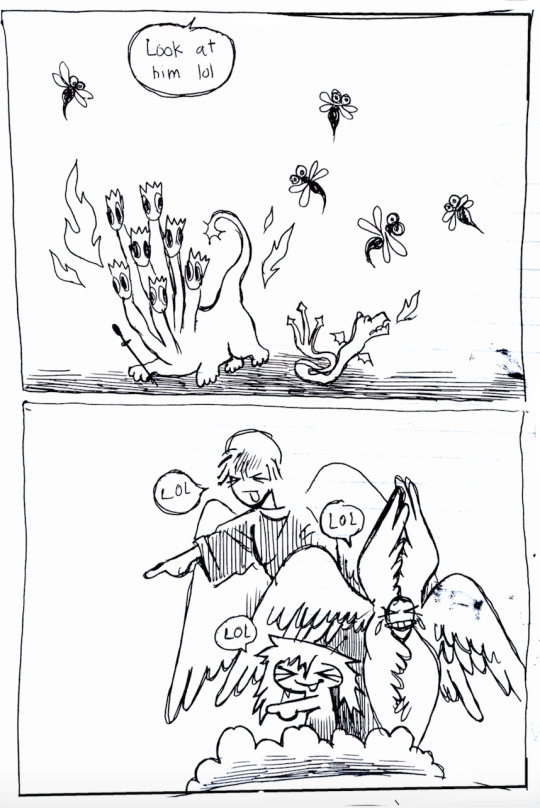#theodicies
Text
For what it means is this, among other things: that for whatever reason God chose to make man as he is—limited and suffering and subject to sorrows and death—he had the honesty and courage to take his own medicine. Whatever game he is playing with his creation, he has kept his own rules and played fair. He can exact nothing from man that he has not exacted from himself. He has himself gone through the whole of human experience, from the trivial irritations of family life and the cramping restrictions of hard work and lack of money to the worst horrors of pain and humiliation, defeat, despair, and death. When he was a man, he played the man. He was born in poverty and died in disgrace and thought it well worthwhile.
Dorothy Sayers on the Incarnation, "The Greatest Drama Ever Staged" (emphasis mine)
#the HONESTY and COURAGE#i encountered this quote in a Keller sermon i was listening to at work so naturally i had to read the whole essay when i made it home#excellent wonderful stuff#pontifications and creations#unto us a child is born#theodicy#be strong and courageous
489 notes
·
View notes
Note
What's God's role in human suffering ?
in it, with us. co-emergent in the affective, illegible spaces of pain. asking us where it hurts and hoping that we, in turn, will ask him the same
323 notes
·
View notes
Text
the book of job is so interesting to me because it's the closest an ancient book of religious scripture seems to come to admitting that any attempt to seek theodicy is in vain--i.e., that a plan of divine justice can't be found because it doesn't exist. like, god not only rebukes job at the end, but he completely ignores job's (extremely reasonable) demands for an explanation, and the only thing that rescues god for the reader, gives some hint that this whole "god" thing isn't a post-hoc attempt to salvage a just world out of a universe that is in fact quite uncaring about humans in particular, is the fact that job's life ends happier than it began.
and yet somehow this story became a landmark of both jewish and christian literature! i think perhaps it's because god's whole "who are you to question me" attitude to job is very useful in service of defending religious authority, and the speeches by job's friends that intimate if you're suffering you must have done something to deserve it, even if you don't know what, also can be used to defend orthodoxy when shorn of context. but as a complete literary object, the book feels to me at best a divine version of the Melian Dialogue, and maybe even as a repudiation of, rather than an attempt to defend, a notion of divine justice. like, the whole point of the story is that job is upright and blameless, that god lets satan fuck him over for no reason. we are told this explicitly. and no amount of "you are just a mortal being, you cannot possibly understand" at the end can make up for the fact that we are told explicitly in the beginning, "the moral of this story is that this god fellow is a real son of a bitch."
#it's also a fertile ground for people to project their own theodicy onto#cf. all the literature and theology that references it in the millennia since
912 notes
·
View notes
Note
how do you keep your faith even while such horrific things are going on in palestine? i've been a christian all my life and i understand that the question of why god allows suffering is one that people have always been asking, that we can never really know the answer to, but it's just so hard for me to see things like this, all of these innocent people being terrorized and murdered in such evil ways, and understand why god can't stop it from happening. in church we pray for both israel and palestine and it feels so pointless, and just makes me frustrated that i can't actually do anything to stop this. especially knowing that even bethlehem, the place of jesus's birth and home to many palestinian christians, is being attacked and churches are being bombed. it seems pretty clear that the people committing these atrocities are never going to open their hearts and stop, and the world leaders who would have the power to make them stop either don't care or directly support them. i do not want to believe that god doesn't exist, or that god would just sit by and watch all of this happen if it were possible to stop it, but it's such a struggle at times like this. i feel like it shouldn't be and like i should've had this figured out by now. it's okay if you don't answer this, i just love your blog and have learned a lot from it over the years, and am incredibly saddened by the state of the world right now.
Hey there, anon. I feel with you and stand with you in your struggle. I also gently suggest you work on letting go of the sense that you "should" have this figured out by now. Firstly because learning to release myself from "shoulds" is something my therapist taught me and it's been super helpful for showing myself love; secondly because I believe it is deeply, deeply faithful to ask these questions, to demand to know where God is in the face of evil — not just once, but continuously across our lives.
If at any point we think we have it "all figured out," if we think we've reached a fully satisfying solution to the problem of how a good God could "let" evil things happen, we're more likely to be numbed by fatalism or become complacent in the face of injustice. As Rabbi Jonathan Sacks (may his memory be a blessing) put it when asked why God lets bad things happen to good people,
“God does not want us to understand, because if we ever understood, we would be forced to accept that bad things happen to good people, and God does not want us to accept those bad things. He wants us not to understand, so that we will fight against the bad and the injustices of this world, and that is why there is no answer to that question.”
Ask the questions. Bring all that you feel — your grief, your confusion, your frustration, your doubt, your fear — to God. Study and pray and converse with others.
And while you're doing all that, and accepting that it'll be a lifelong exploration, act.
Let your love, your words, your actions be the divine response to injustice — because for whatever mysterious reason, God chooses to act through us, through all who follow Their call to "do justice, love kindness, and walk humbly" (Micah 6:8).
___
So yeah, I can't tell you why God doesn't just jump in and stop the evil, why God seems to limit Their own power to intervene (or even to lack that power to begin with), why God respects our free will even when we misuse it to such great harm (though you can see the bottom of this post for places to explore all those questions).
But I can tell you where I believe God is in the midst of all the questions, all the loss, all the suffering — and that's not on some lofty throne indifferently observing our pain; God is right there in the midst of that pain.
Where is God in the face of hate, violence, death? God is co-suffering with us, shouldering the burden with us.
In Exodus 3:7, God says They don't only see the enslaved Hebrews' misery, don't only hear their cries, but that They know the people's suffering — an intimate knowing, as of one who experiences it themself.
In Matthew 25, Jesus tells us that when humanity fails to welcome the stranger, visit the prisoner, feed the hungry, clothe the naked, comfort the oppressed, we fail to do those things for him — for he identifies so intimately with all whom the world calls "least" that he is one with each and every one of them.
So I don't know why God doesn't just fix everything, dammit! — it's the first question I'll be asking Xir when I die, because wtf!!
But I do believe, and I do draw some comfort knowing, that God does not leave us to suffer alone. God is one with the oppressed; God shows ultimate solidarity to the oppressed; and God acts with each of us who act for and with and as the oppressed.
And the good news in the midst in this horror is that there are things that all of us can be doing to act in solidarity with the oppressed!
Our efforts truly are making a difference. Politicians and whole governments across the globe have been startled by the resistance to pro-Israeli propaganda and solidarity with Palestine. The change is slow, but our protests are making an impact. Palestinians have been asking that we keep protesting, boycotting, educating, spreading the word. Because it is helping, slowly but surely.
As long as Palestinians refuse to give in to despair, we too must continue to fight. Palestine will be free. We will not stand silent as genocide occurs.
Boycott as many of the companies named by BDS as you can. Notice that they're focusing on a narrower, more targeted group of companies than some of the enormous lists people keep sharing — that's to help us avoid becoming overwhelmed! So boycott what you can from their list; these are the companies directly contributing to Israel's violence. And spread their list to anyone you can.
If you live in a country with a government that has yet to join the call for a ceasefire — and especially if you, like me here in the US, live in a country that is actively funding/otherwise supporting Israel's violence — call or email your representatives to demand a ceasefire.
Resistbot can help make that easy, in the US at least.
Educate yourself about the history of Palestine and Israel. It's important so that you can recognize lies and propaganda, and also so you can speak knowledgeably about the issue with others. It's also important because understanding and simply bearing witness are two big things Palestinians ask of us. You don't need to know everything, but know enough to bear witness, to remember the loss, and to debunk bullshit when you see it.
Here are some places you can get educated — link to free ebooks; article on current events; article with current perspectives from Gaza; and I've been reblogging news & resources as I see them over on @a-queer-seminarian
Post about what Gaza is going through on social media!! Don't let the fight die down! Talk about it with friends or others you think might be swayed to join the fight if they had the information that most media stations are failing to report on.
Stand up against Islamophobia in all forms.
Stand up against antisemitism in all forms. As Christians, this includes recognizing and uprooting supersessionism in our biblical interpretation, our liturgy, our hymns, etc. It also means learning about Christian Zionism.
One of Israel's primary arguments for the "necessity" of its oppression of Palestine is that Israel is necessary because nowhere else on earth is safe for Jews. They're right that nowhere else is safe for Jews; but they're wrong that Israel is safe for Jews — an settler-colonialist state, a war zone, a state that requires every civilian to serve some time in the military, is not safe for Jews either. But as long as they can point to the antisemitism rampant across the globe, they can use that as an argument. So to counter Israel, and much more importantly to stand in solidarity with Jewish people across the world, don't let antisemitism go unchecked.
Join in protests in your area. Follow Jewish Voices for Peace or Jews Against White Supremacy for info on such events.
Link to places to offer fin.ancial support
Want more ways to act? Check out https://www.palestineaction.org/
___
There is no easy answer to the question of suffering — but even so, it can be helpful to explore it deeper, to examine what conclusions others have drawn over the eras. If you want some resources for your wrestling, here are some:
This post goes into the basics of theodicy, the "the intellectual effort to jerry-rig three mutually exclusive terms into harmony: divine power, goodness, and the experiences of evil"
Then there's my #theodicy tag where I put all posts / links about this issue
I also have a long-ass YouTube video diving deep into "the problem of suffering"!
___
I hope this response brings you comfort and courage, friend. Don't be afraid of questions, of grief, of concern — let them galvanize you for the struggle. Solidarity forever <3
75 notes
·
View notes
Text
my philosophy professor mentioned the book of job in class and i started giggling and twirling my hair
#chanposting#imagine your student hands in a 3 page paper about theodicy and the existence of god#and there are little hearts scribbled around a poorly-drawn bildad the shuhite#‘i ❤️ bildad the shuhite’ is written on the page in glittery pink pen#good omens#neil gaiman#crowley#good omens 2#bildad the shuhite
67 notes
·
View notes
Text
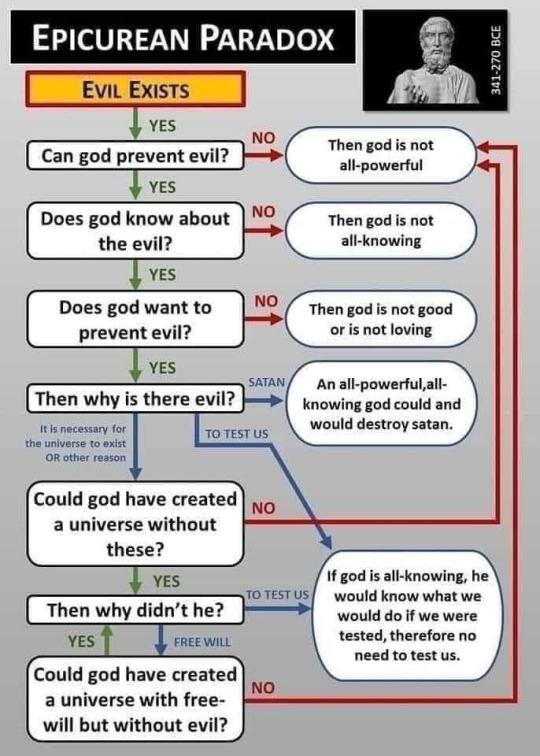
https://en.wikipedia.org/wiki/Epicurus#Epicurean_paradox
"Is God willing to prevent evil, but not able? Then he is not omnipotent. Is he able, but not willing? Then he is malevolent. Is he both able and willing? Then from whence comes evil?"
https://en.wikipedia.org/wiki/Theodicy#Reasons_for_theodicy
Theodicies are developed to answer the question of why a good God permits the manifestation of evil, thus resolving the issue of the problem of evil.
In science, when an idea is falsified, it's either thrown out, or withdrawn and revised. In theology, you invent an entire bogus domain to pretend it's still true. Theodicy is that domain. The entire reason it exists at all is because the Problem of Evil shows the god claim doesn't work, but they won't admit it.
Isaiah 45:7
I form the light, and create darkness: I make peace, and create evil: I the Lord do all these things.
#Epicurean paradox#Epicurus#problem of evil#theodicy#religion#free will#evil#religion is a mental illness
168 notes
·
View notes
Text
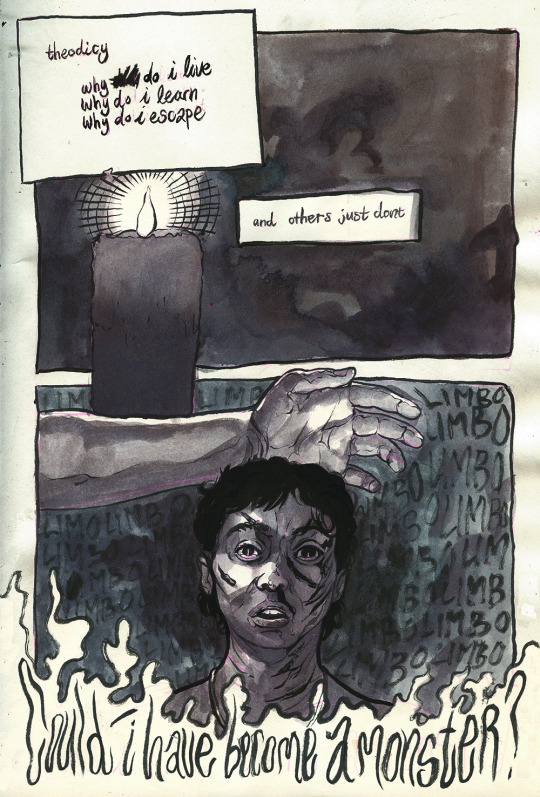
'talk to me' hurt very bad
gotta figure it out somehow
so have this comic
75 notes
·
View notes
Text
Smthn smthn Eugenides asking Costis at the end of koa 'will you serve me and my god?' and when Costis says yes, Gen says to him 'then come out' (knowing that you'll never die of a fall unless he drops you etc etc etc) vs. Christ calling Lazarus from the tomb and everything that entails
#smthn smthn also like. the shortest biblical verse#jesus wept. smthn about gen as both human and divine. a tool of the gods. he can hear his god a little longer#it is not that eugenides the god causes his thieves to fall#but that he permits them too#smthn smthn theodicy. evil is not caused but permitted to occur. only in service of greater goods#goods we cannot see or understand. and which perhaps need to forgive the gods for#would you see your hand returned. and attolia lost to the mede?#IM. SO NORMAL#SO SO NORMAL TODAY#queen's thief#fran reads
52 notes
·
View notes
Text
It would suck to be God's lawyer. No way He's beating the allegations.
20 notes
·
View notes
Text
8 year-old kid who just dissociated after being taught too much philosophy: mum, I'm scared about the existence of free will, can I sleep in your bed?
English teacher mother: I don't know, can you?
Kid having a panic attack:
26 notes
·
View notes
Text
The Suffering God
In all religions, a question mark has been set against the omnipotent and serene gods by the sufferings of men. But only in Christ does the concept of a suffering God appear. […] Only in Christ does it become clear that we can put God to death because he has put himself in our hands. Only since Christ has God become dependent on us. Christ did not identify himself with a calm spectator of all our troubles. Christ, by his teaching, life, and death, made plain the helplessness of God in the world; the suffering of unrequited and unsuccessful love.
[...]
That God in the world has been, and still is, mocked and tortured, burnt and gassed: that is the rock of the Christian faith which rests all its hope on God attaining his identity. This pain is inextinguishable; this hope can never be taken away. What Christians share in common is 'their participation in the sufferings of God in Christ. That is their faith.' In this faith they know that God is helpless and needs help. […] He put himself at risk, made himself dependent on us, identified himself with the non-identical. From now on, it is high time for us to do something for him.
- Dorothee Soelle (Christ the Representative: An Essay in Theology After the 'Death of God,' pages 151, 151-152). Bolded emphases added.
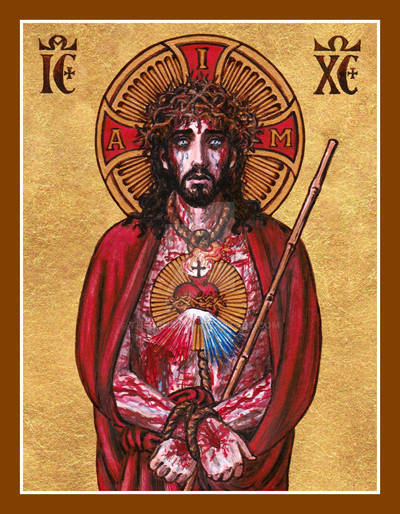
Man of Sorrows, by Theophilia
#Christianity#theodicy#Jesus Christ#Incarnation#vulnerability#compassion#suffering#Sacred Heart#Ecce Homo#Divine Mercy of Jesus#Dorothee Soelle
27 notes
·
View notes
Text
Just to clarify my thoughts (since I've had a number of people ask me about it) re: Job and cursing God. There's a big difference between cursing God as used in Scripture and how we generally would think of cursing at God today.
Cursing someone, in the Bible, has a lot of depth to it. It's not just saying "screw you " in anger, it's got a sense of forsakenness to it. It's the opposite of a blessing, a removal of blessing. If the blessing is presence, your face shining on the person you're blessing, then a curse is absence. In some translations, Job's wife tells him to "renounce God and die," which I honestly think makes a lot more sense to modern ears.
Job says a lot of unpleasant things to and about God in his anger and grief. So do the Psalmists. A number of the Prophets. So can we. God can take it if we come to him with honest expressions of our emotion, including those not-so-nice ones directed at him. I don't think there's anything wrong with getting mad at God and saying, "How dare you, you bastard" when you suffer unjustly. You can say much worse, I think, without sinning, though I don't feel particularly inclined to give examples. But as long as it's an honest expression of your heart, I think you're doing exactly what prayer is for. You're presenting him your heart with an open hand. He can use that. Opposite of love is not hate but indifference, etc.
Job doesn't renounce God. Neither should we. But I think when you're truly suffering, you're gonna have those feelings toward God either way. He'd rather you address them with him directly than try to avoid them. Cursing at God in the modern sense is actually a great way to keep the relationship strong and not end up cursing/renouncing him in the Biblical sense.
#i did try to draw that distinction in the original post but I didn't really go into detail#mostly bc i was trying to be concise and just focus on how the church talks to sufferers#so here's the long version#pontifications and creations#only thou art holy#also side note: there was someone yesterday who responded to that post with the suggestion that suffering is generally the sufferer's fault#and it got worse from there#just an absolutely rank response that had me immediately blocking that person and googling if there was a way to remove someone's addition#idk to what degree that person is an active member of this broader christian community we've got going on here#but if you see that post (and you'll know it when you see it) please as a favor to me don't interact with it#there were some lovely responses and additions to that post yesterday too#but that one made me mad#idk. to a certain degree i wanted to vent#they're blocked now though so whatever#anyway. I've sort of been percolating on these various thoughts for a few weeks#since i went to a really fluffy women's talk on suffering#and now i kind of want to give my version#I'm far from the greatest sufferer in the world. i am well aware of that#but as I've been sick I've just done So Much Thinking and reading about theodicy and struggle with God that i feel qualified to opine#unlike the giver of that talk#anyway#tag rant over#...for now#theodicy
165 notes
·
View notes
Text
Finding "the meaning" to a show that could have had up to five or seven seasons but was cancelled after the second is somewhat like trying to understand a novel composed of seventy chapters by having read only twenty — there is a whole wealth of information which we do not possess that could alter our reading of any given element or of the entire thing in itself.
Still, there are always patterns that weave a story into a cohesive unit and they can help us to better grope in darkness towards comprehension. One such pattern in Warrior Nun appears to be how the consequences to mistakes, "sins" or evil deeds committed by characters manifest.

Basic storytelling usually requires characters to act on something so that complications or resolutions may arise from their choices and move the plot forwards. In Warrior Nun, many of these actions are quite tragic in nature: Suzanne's arrogance and pride lead to the death of her Mother Superion; Vincent's allegiance to the higher power he believed Adriel to be inspired him to kill Shannon; Ava's flight from the Cat's Cradle ends up damning Lilith as she is mortally wounded and taken away by a tarask... All of these events have negative outcomes and heavy repercussions on all characters directly or indirectly involved. Something changes permanently because of them, be it in the world around them or within the characters themselves.
And yet, it would seem that all of these dark deeds not only move the story forwards but might also have overall positive results. We would have had no protagonist without Ava — and she would arguably never have received the halo to begin with had she not been murdered. What's more, on a personal scale, the horrifying crime she suffers is, in the end, the very thing that allows her a second chance in life, a new life.
An act of outside evil permits Ava to grow and develop, shows her a path she would not otherwise have found. Without her own season in some sort of hell, Lilith would not have been able to advance towards other ways of being and understanding beyond her very strict limitations. Vincent and Suzanne would not have embarked on their own journeys of enlightenment without having caused the pain they are responsible for.

Beatrice might have been paying for someone else's mistakes, but she, too, is given the chance to grow into herself through it. The afflictions that torment these characters advance the overall plot, but they also advance them, as individuals, as long as they are willing to learn and keep going despite the calamities large and small that they are faced with. Beatrice keeps going after parental rejection, Mary keeps going after losing Shannon, Jillian keeps going after losing her son (in part through her own actions, adding insult to injury)... Trouble and the adaptation that follows it, if one is open enough to learn from the experience, motivates the characters, propels them forward, teaches them.
The problem of evil has occupied the minds of many a thinker throughout the ages, given how the very existence of it, evil, might call into question that of God (a good, omniscient, omnipotent one, anyway). A common way of justifying suffering (and also God), then, is by claiming, as Saint Augustine, that "God judged it better to bring good out of evil than not to permit any evil to exist".
Now, it would be rather ridiculous to say of Warrior Nun that it follows in Leibniz's footsteps, also because this philosopher, expanding on the augustinian concept, attempted to defend the goodness of a real God with his "best of all possible worlds" while all we have is... Well, whatever/whoever Reya is.

But there seems to be an inclination towards some sort of optimism as a worldview nonetheless.
Betrayals reveal truth and grant knowledge (Vincent's culminates with the coming of Adriel, which allows us to know of the threat of a "Holy War" and thus prepare for it; Kristian's gives Jillian much needed insight, William's lights up the fuse for the fight to be taken more seriously...), crimes committed willingly or not open the way for Ava (Suzanne's killing of her Mother Superion causes the loss of the halo, which is transferred to Shannon, whose death opens the gates for Ava to walk through after being herself murdered by sister Frances)... The magnitude of these positive outcomes is perhaps not "balanced" when compared to the evil that brings them about, but there is still something to take out of the catastrophe.
However tragic the tones of a given event, the show itself appears to shun the predetermination that makes tragedy as a genre; if everything is connected, here it at least appears to not necessarily drag everyone into their horrible dooms.
What's more is that this lurking "optimism" matches really well with our own protagonist's personality.

And it makes perfect sense that Ava would do the best she could with whatever she is given.
Life for her, in the conditions she experienced after the accident, would have been unbearable without some sort of positive outlook on life. However deadpan, the joking and the "obscene gestures" and whatever other forms of goofing around beside Diego are a way of turning a portion of the situation in her own favour. Proverbial eggs have, after all, already been broken right and left — might as well make an omelette of whatever remains.

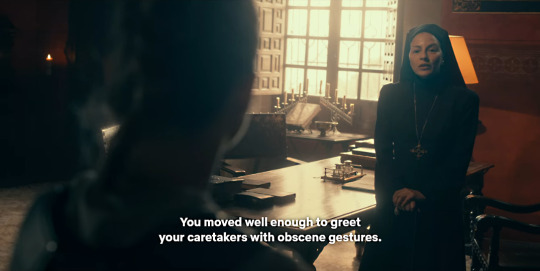
Humour is just another way of looking at the bright side of something, or, at the every least, of mitigating the utter horror it might bring. If the show allows for moments of lightness, if it lets us laugh, if it takes us through a perilous voyage which still bears ripe, succulent fruit instead of the rot of pessimism and its necessary contempt for humanity, it is because Ava herself sees things in this way. It isn't gratuitous or naïve in this case, but a true survival strategy, especially as it is confronted with the morbidity of Catholicism.
Here is a religion that soothes its faithful with the promise of reward in the afterlife — how else does one charge into battle against the unknown, risking one's own death along with that of one's sisters, without the balm of believing that we shall all meet again eventually, "in this life or the next"? How else does one come to terms with the ugliness and the pain of this existence if not by looking forward to a paradise perfect enough to make all trials and tribulations here worth it?
True nihilism would have annihilated Ava. Her present perspective is what avoided the abyss.
And there is nothing Panglossian to her attitude or what the show might imply by giving us her view on things. This isn't about "the best of all possible worlds", but of making the best of whatever situation we're in, of taking what we have and doing something with it, something good, something of ourselves. It isn't God making good out of evil, but our choices.

Killing innocent people and feeling no remorse will never be the best someone can aspire to do. Sister Frances, cardinal William, Adriel all learn this the hard way.
Those who do their best find that, somehow, they can move on from whatever it was that paralysed them. Ava, most of all, knows what it is to be stuck, frozen in place; she can never be the character who refuses to grow, even through pain, lest she condemns her spirit to the same fate her body is all too familiarised with. Those around her wise enough to let themselves be touched by her, by the dynamic power she carries, walk forth with her and live.
It says very little about "God" that Warrior Nun should adopt its heroine's views and seem "optimistic" as it progresses — but it speaks volumes about the values it presents for pondering, of the inspiration its protagonists provide, and of the multiple reasons why this is a story unlike most others.

#warrior nun#ava silva#you know it's actually very funny to type this as someone who is very schopenhaurian with hints of nietzsche#but i AM doing the best i can too :)#again i will reiterate that i don't think this apparent optimism has anything to do with the classic theodicy#if anything i see it more as a cry in favour of antitheism -- this is YOUR life fuck god#life is shitty so carve out your own makeshift paradise out of the wreck you are given#and don't make things harder for anyone else in the process if you can avoid it#(but that might just be the luciferian in me speaking lol)#anywho this post is a translation of one i wrote not too long ago in cryptic english and a ton of tags#so if it seems familiar that's why#also i do find it rather telling that whenever i try to delve into how the show structures things i talk about ava#i don't set out to analyse her -- but in analysing the show i must analyse her as well if by the edges#which again points to how finely woven she is to the fabric of the entire thing#remember how i said ava is a representation of free will?#well this whole bringing good out of evil thing also touches upon it#saint augustine maintains that it is precisely free will that allows us to do it -- to choose good#of course he means it in a sense of being free to pursue god rather than evil but you see the parallel still works#(this is the post i mentioned in the last reblog. figured i'd go ahead and throw it in the wild since there are more brewing)#analysis and similar#exercises in observation
121 notes
·
View notes
Note

a present, for you- another salem meme!
(also ironically while rewatching this episode to find a good enough screenshot i thought of salem as cain while listening to the brothers telling her about her curse; but i'm not actually a christian so you probably know what possible allusions she could have better than me)
HRGDHSJCJ
oh the less said about the christian perspective on job the better <3
BUT LISTEN
LIIIIISTENNNNN
the book of job begins with the deity and the satan making a wager on the matter of job’s faith, because the deity points him out to the satan like ‘isn’t my servant job the most righteous man alive’ and the satan goes ‘of course he is, you’ve given him a charmed life, take back your blessings and see how long it takes him to curse your name’ and the deity is like ‘bet.’
so the narrative conceit here is the deity gives the satan free rein to torment job so as to reveal whether his faith is true or not: all of his wealth (livestock) is brutally wiped out or stolen by raiders who put most of his household to the sword, all ten of his children are killed, and finally he’s struck with a debilitatingly painful affliction. then his wife tells him to curse god and die and several of his friends come to sit with him in his ABJECT MISERY and that’s the end of the prologue.
the narrative proper is largely a series of discourses between job and his friends on the subject of whether or not he Deserved This.
his friends (eliphaz, bildad, zophar, and elihu) hold a belief in the absolute justness and rightness of the deity which demands that job’s suffering is either punishment for some grievous wrongdoing or else discipline meant to teach him something important.
job’s position can be summed up as “fuck you, there is nothing i could possibly have done to deserve this, i am being unfairly persecuted and because NONE OF YOU ASSHOLES BELIEVE ME I WILL MOUNT A LAWSUIT AGAINST GOD TO PROVE MY INNOCENCE”
and i just—
quotations are from edward greenstein’s excellent translation (read it it fucks)
JOB!
[3:20–22] Why give light to one in travail?
Or life to those bitter of spirit?—
Those waiting for death, but there is none,
Though they dig for it more than for treasure!
Those singing for joy at the mouth of the tomb,
Who are glad to be reaching the grave.
JOB!!
[7:17–18] What is a mortal that you treat him as important?
Why do you pay him any mind,
Take account of him each morning,
Test him every minute?
[19] Why can’t you just look away from me,
Let go for just a swallow of spit?
[20] If I’ve sinned, what can I do to you,
O Watcher of Humankind?
Why have you made me your target?
How could I be a burden to you?
[21] Why can’t you pardon my transgression,
Commute my punishment?
For I’ll soon be lying in the dirt—
And when you seek me, I’ll be gone.
JOB!!!
[19:21] I am innocent—I care not for my self;
I’m fed up with my life.
[22] It is all the same.
And so I declare:
The innocent and the guilty he brings to (the same) end.
SCREAMING CRYING THROWING UP
[10:1] My entire being despises my life.
I would prepare a complaint on my behalf,
I would speak in the bitterness of my being;
[2] I would say to Eloah: “Do not condemn me!
Let me know of what you accuse me!
[3] Does it do you any good to do wrong?
To reject the effort of your hands?
While you shine favor on the schemes of the wicked?
[4–5] Have you eyes that are of flesh?
Do you see as a mortal sees?
Are your days like the days of a mortal?
Are your years like those of a man?
[6–7] When you go looking for my crime,
And investigate my sin,
You know very well I am not guilty—
But no one can rescue from your hand!
[8–9] Your hands formed me and made me,
Put me together—then destroyed me!
Mind now, it is you who made me like clay,
And will return me to the dust!
I WILL TAKE MY FLESH IN MY TEETH
[13:13] Keep silent before me, so that I may speak—
Whatever may come upon me!
[14–15] I will take my flesh in my teeth,
And I will place my life-breath in my hand.
Though he slay me, I will no longer wait—
I will accuse him of his ways to his face!
SO YOU OBLITERATE A MORTAL’S HOPE
[14:18–19] And yet, a cliff will fall and crumble;
A mountain will be moved from its place;
Rocks are worn down by water;
A torrent sweeps away the earth’s dust;
So do you obliterate a mortal’s hope.
[20] You assault him continually—and he passes on;
You disfigure him—and then you dispatch him.
AUGH!!!
[16:6] If I speak out, my pain will not be spared.
But if I desist, how will it leave me?
[7] By now he has worn me down;
You have devastated my entire company.
[8] You have shriveled me, and this has become a stigma;
My gauntness stands up and testifies against me.
[9] As his anger rages, he strikes a hostile pose;
He gnashes his teeth at me;
My enemy sharpens his eyes at me.
[10] People’s mouths gape at me,
They strike my cheeks to shame me;
They all form gangs against me.
I JUST—
[19:21] Have compassion, compassion, you my friends!
For the hand of Eloah has afflicted me.
[22] Why do you like El persecute me?
Why can’t you get your fill of my flesh?
HE SWEARS OVER AND OVER HE ISNT LYING
[27:3–4] So long as there is life-breath within me,
And in my nostrils Eloah’s spirit,
I swear that my lips will speak nothing corrupt,
And my tongue will utter no deceit.
JOB!!!!
[30:26–28] For I hoped for good, but there came bad;
I expected light, but there came darkness,
My insides roil and can’t be still;
I’ve been greeted by days of affliction.
I walk in gloom without a sun;
In the assembly I stand and cry out.
SORRY I LITERALLY CANNOT READ JOB WITHOUT BECOMING DERANGED. (BUT DO YOU SEE. WHERE I AM GETTING THE SALEM CONNECTION)
anyway in chapter 30 job makes an oath of his innocence and (after a very! lengthy! interjection from elihu) the deity turns up in chapter 38 to answer job’s lawsuit by going, in essence, WHO DO YOU THINK YOU ARE? I’M GOD! whereupon job is literally like
[40:3] Up spoke Job to YHWH and he said:
[4–5] Lacking respect, how can I answer you?
My hand I place over my mouth.
I have spoken once and I will not repeat;
Twice—and I will (speak) no more.
“ANSWER MY FUCKING QUESTION IM NOT GOING TO REPEAT MYSELF”
who else is doing it like job
then the deity goes LOOK AT THESE AWESOME CREATURES I MADE. CAN YOU TAME THE LEVIATHAN, JOB? HUH? EVEN GODS TREMBLE BEFORE HIM
and then—well the standard translation reads job’s final statement as repentance but this is notoriously a difficult passage, and as a matter of narrative and the context of the chapter as a whole i think greenstein’s reading makes considerably more sense—anyway job goes:
[42:1] Up spoke Job to YHWH and he said:
[2] I have known you are able to do all;
That you cannot be blocked from any scheme.
[3] “Who is this hiding counsel without knowledge?”
Truly I’ve spoken without comprehending—
Wonders beyond me that I do not know.
[4] “Hear now and I will speak!
I will ask you, and you help me know!”
[5] As a hearing by the ear I have heard you,
And now my eye has seen you.
[6] That is why I am fed up;
I take pity on “dust and ashes!”
(in 42:2 job is echoing the language the deity uses in genesis 11:6 in reference to the builders of the tower of babel; ‘dust and ashes’ is an epithet for wretched humanity and also occurs in chapter 30.)
I TAKE PITY ON DUST AND ASHES.
WHO IS DOING IT LIKE JOB
imagine being so DONE that you have the wherewithal to be scathingly sarcastic TO GOD’S FACE
and then the deity praises his honesty, scolds his friends for bleating platitudes instead of speaking the truth, and restores everything that was taken from job and more THE END.
/lies down
read job. theodicy of all time
one day i am going to calm down about job enough to finish my actual. coherent salem-as-job screed instead of just firehosing out half the passages that make me DERANGED but DO YOU SEE. DO YOU SEEEEEEEEEEE
horrific torment at the hands of divine beings for the pettiest of reasons. unspeakable anguish. isolation and exile! desolation! absolute certainty that his suffering is cruel and unjust! utter scorn for deceit and falsehood! he cannot rest because the deity will not let him die no matter how he begs for death! his wife his friends his community all turn against him, repulsed by his agony! he sues god!! he tells god i hear you, i see you, i feel fucking sorry for all of us who mean nothing to you!!!
53 notes
·
View notes
Text
WHY YOUR MORALITY IS MY PROBLEM: modern holdovers from ancient theology
James Dobson, founder of the ultra-conservative Focus on the Family organization, reputedly said of the 2012 Sandy Hook mass shooting, “I think we have turned our back on the Scripture and on God Almighty and I think He has allowed judgment to fall upon us.”
As heartless as that sentiment sounds today when addressing the murder of 20 first-graders (and 6 adults) at an elementary school, it reflects a once-common theology that emerged about four thousand years ago in the ancient near east (ANE*), then bled into the Mediterranean basin and developed an astonishingly long half-life. It’s why some Christians (et al.) are so, so concerned with what their neighbors are doing behind closed doors. Or on their front lawns with all those Pride flags.

In some ways, ANE and Mediterranean religion had a lot in common, being traditional and focused largely on sacrifice/action (orthopraxic). Over time, some orthodoxic religions also arose in that area. So, first, let’s do some quick defining.
Orthopraxic religions focus on what one DOES, not what one believes. Performing the sacrifice correctly, honoring the gods/ancestors appropriately…that’s how one shows piety. Infringing against purity laws or other affronts to the gods (impious actions) can result in expulsion from the community. Fights over correct practice can lead to schism in a community.
Orthodoxic religions focus on what one BELIEVES. Thus, they need some form of authoritative text to determine what IS right belief, resulting in the emergence of a canon (e.g., Zoroastrian Avesta, Jewish Tanakh, Christian New Testament, or Muslim Qur’an). In Orthodoxic religions, wrong beliefs (heresy) can result in expulsion from the community. Fights over correct belief can lead to schism in a community.
(There’s yet a third focus, orthopathic, but that largely doesn’t apply here. “Orthopraxic” can also apply to ethics-based religions, but here, it applies to ritual/cultic behavior.)
Most religions have elements of all three, but it matters where the weight falls. Yes, religions can emphasize two sides of the triangle more heavily, less on the third, but even then, one point will be the chief measurement of devoutness among followers. This also helps us understand why two religions might not understand each other very well sometimes. They’re trying to impose one set of “What religion is for” ideas on another, with entirely different assumptions.
The religions of the ANE and Mediterranean had much in common in terms of the purpose of religion: to maintain the health of a community. This depended on the piety of that communities’ members. Their gods weren’t moral in the modern sense, but could be jealous, fickle, and petty.
Why were they gods then?
Because they were immortal and more powerful.
Yet an important difference between (many) ANE and Mediterranean religions were the concepts of sin and “mesharum” (divine justice/equilibrium). If the latter existed (sorta) in Mediterranean society, “sin” really didn’t. Impiety differs as it can include ritual matters too. So, if murder (especially kin murder) created uncleanness anywhere and is a moral/civil matter, menstruation and sex also created uncleanness, but were not moral/civil matters defined as “bad.” So “unclean” ≠ “sin.”
To be unclean is a matter of cultic purity, different from moral purity. Yes, ANE religions also had ritual uncleanness, to be sure. And yes, some things that make one unclean also have intimations of “badness” without being so extreme as murdering someone. Yet I want to underscore the difference because it’s very real and too often ignored/misunderstood/unfairly conflated.
Many Mediterranean religions did not have “sin,” just unclean and impious. MORAL/ETHICAL matters were dictated by civil law and later, philosophic discussion. Not religion. Yet in the ANE, moral infractions were affronts to mesharum (divine order) and were therefore a religious matter. This oversimplifies, but smash-and-grab works for now. We find actions (like iconoclasm) in the ANE that didn’t often apply in the Mediterranean. (Iconoclasm is the deliberate theft, or in extreme cases, destruction of religious icons or structures.)
Yet what both groups shared was a sense that the gods had, well, “bad aim.” If people in a community were impious and/or sinful, that might draw the ire of the gods. Plagues were often seen as divine retribution for the impiety and/or sin of one or more members of that community, but not necessarily all of them. This led to the exile of impious individuals, as well as the ANE “scapegoat” ritual, et al. (If you’re familiar with the plot of the Iliad, Apollo punished the entire Greek army for the impious actions of Agamemnon.)
I could DIE from your impiety/sin committed in my town/community.
That makes your morality my business.
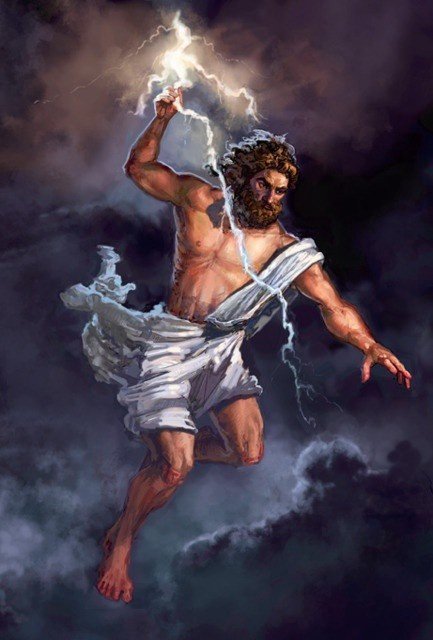
In addition, especially in the ANE, war on earth was believed to reflect war in heaven. Gods had cities and peoples, not the other way around. They chose you, you didn’t god-shop—hence Israel as a “chosen people.” Well, yeah, pretty much every ethnic group was chosen by some god(s). But as a result, if your side lost in a war, then—theoretically—your gods were weaker. Maybe you should go over and start worshiping their gods. Yet that didn’t sit well with most groups, so by the Middle/Late Bronze Age, we see an emerging idea that my god isn’t “weaker” than yours, rather my general “set forth without the gods’ consent,” or my god permitted the other god(s) to win for whatever reason…usually due to sin or a lack of piety among his (or her) people. Of course we find this in the prophetic literature of the Hebrew Bible, but it’s in a lot of other ANE literature too. Nabû or Marduk didn’t lose, they “went to live with” Ashur for however many years—although the winning side will portray the victory as Nabû and Marduk traveling to Nineveh to bow before (e.g., submit to) Assur.
Again, this is simplified, but we don’t see this sort of language used in Greece where Hera would bow to Athena because the city-state of Athens defeated Argos, even if, as promachos (foremost in battle), Athena might be expected to win in any conflict between the two (as in Euripides’ Children of Herakles). Hera is still queen of the gods, and—even more—these are shared deities. We also don’t see it because notions of “sin” don’t apply and only a handful of wars were ever called “sacred”—all of them concerning Delphi and cultic purity. At least one of those is mythical, the second probably didn’t happen, and the third (which certainly did happen) was labeled “sacred” only by one side. Greek gods just weren’t seen to uphold justice in the same way. Roman gods were more concerned with such things, but still not as we find in the ANE.
Ergo, the ANE faced the problem of theodicy: if god/the gods are good/just, why does tragedy happen?
Early explanations for tragedy were simple: those who suffer must have earned their suffering, sometimes referred to as Deuteronomic Theology: “good things happen to good people”/“bad things happen to bad people” (and maybe their neighbors too, by chance).
Pushback against this notion emerged around the same time a more nuanced view of loss in war emerged. People began to ask the corollary: “Why do bad things happen to good people?”
The (c. 1700 BCE) Mesopotamian Ludlul bēl nēmeqi (The Poem of the Righteous Sufferer) attempted an answer. About a thousand years later (600s-500s BCE), the Jewish Book of Job took it on as well. In both, the protagonist asks, “Why does Marduk/Yahweh punish me when I’ve been a faithful servant?” Both protagonists were previously wealthy/powerful, which was seen as divine approval. Losing that wealth/health suggested they had offended their god (and are being punished). Yet each one claims he did not sin—so why?
The answer in both works is similar: there’s not really an answer. Marduk restores Šubši-mašrâ-Šakkan, who ends the poem with a prayer of thanksgiving. Job has a chat with Yahweh, who essentially tells him, “You’re a measly mortal, don’t question me.”
The KEY element in both, however, isn’t the answer, but the assertion that a good person can suffer. They didn’t earn it; it just happened. They remained good and, eventually, their god restored them to their prior station, and then some.
Ergo, if you’re suffering, just be patient. Don’t curse God and die. (As Job is advised to do.)
Today, we may find such an answer wanting but need to recognize it for an advancement on the theology of tragedy.

Some, however, get stuck in these time-locked answers because they can’t allow their religion to grow. Or rather, they can’t acknowledge that their religion/theology evolves over time, because if it evolves, it wasn’t perfect from the beginning. And that challenges their understanding of their god.
Yet the real fly in the ointment is the notion of a perfect and infallible canon.
This brings me back around to what a canon is. It just means “an authoritative text,” but how that text is understood has nuances. INSPIRED ≠ INFALLIBLE. Most all followers of a canonical text believe it’s inspired by God, but not all (or even most) believe it’s infallible. (Islam is its own category here, note.) That creates some problematic GRAYS.
If it’s only inspired, written by humans with human foibles and history-locked understandings, interpreting it becomes complicated and can lead to disagreements. Taking a literalist view sweeps away the messiness. “God said it; I believe it; that settles it!” Black-and-white.
Those who believe in Biblical literalism/inerrancy (which includes a good chunk of conservative Christian Evangelicals and all Fundamentalists**) will argue ALL the Bible is true. If it’s written by God, it must be perfect from the get-go. Thus, a clash is created between simpler versus more nuanced views: Deuteronomy vs. Job. If an earlier view must be as true as any later one, that reduces everything to the most elementary version. It can’t evolve/grow up, yielding what feels to most like a very archaic (and often harsh) worldview.
In any case, both the traditional orthopraxic and orthodoxic religions of the ANE/Med Basin believed God/gods punished people who offended them. AND these punishments might “spill over” onto family and neighbors.
Ancient divine collateral damage.
Ironically, this is WHY early Christians were prosecuted by the pagan (e.g., traditional) Roman and Greek religious establishments. Christian failure to participate in common civic religious cult could earn divine ire. For their first two/two-and-a-half centuries, Christianity was labeled a religio illicta (illegal religion)—in part for “failure to play well with others.” E.g., make sacrifices to the appropriate Greco-Roman deities. Thus, when disaster struck, a scapegoat was sought. Those antisocial Christians are to blame! They don’t sacrifice to the gods and so, offended XXX god, who is now punishing ALL of us with YYY.
Classic ancient religious thinking, but it’s one reason I find current conservative Christian opposition to Teh Gays, trans folks, etc., enormously ironic. The persecuted have become the persecuting.
I want to emphasize that large sub-groups of Jews, Christians, and Muslims have evolved past such theologies. Yet others have not and stubbornly cling to ancient mindsets. That’s why they argue the mere presence of LGBTQI+ people will bring down the wrath of God on ALL.

Talk of “grooming” and “protecting children” is just an attempt to make palatable a belief they know won’t fly with most people, who they consider deluded by The World (e.g., the devil). Trickery is therefore required. As they’re deeply afraid themselves, they understand fear and use it to motivate others. Many are perfectly happy to make their beds with “unbelievers” long enough to get their agendas passed. God will forgive them.
This, too, is rooted in ancient ideas (discussed above) whereby a people’s own god might employ the enemy to punish them (or others). Thus, a sinful person can be utilized on the way to righteous ends because the victory of God wipes away all else. Using the enemy to effect God’s will just proves that God is in final charge of everything after all. It’s the ultimate PWN.
I hope this helps to explain where these ideas come from, how they originally emerged, and why a subgroup of people still cling to them.
————-
* While Egypt influenced the ANE, as well as Greece and Rome, and is often shoehorned into the ANE, I consider Egypt as NE Africa. It deserves to be treated on its own, or in relation to neighbors such as Kush.
** Fundamentalists and Evangelicals tend to be equated but are not the same. Also, not all Evangelicals are conservatives (although all Fundamentalists are, by definition). Enormous variation exists between Christian denominations, which range from ultra-conservative to (surprise!) ultra-liberal. There is as much of a hard Christian Left as there is a hard Christian Right. We just tend to hear far less about them.
#iconoclasm#mesharum#deuteronomic theology#book of job#poem of the righteous sufferer#ancient theology of tragedy#theodicy#ANE theology#ancient Mediterranean theology#Classics#ancient near east#ancient religion
25 notes
·
View notes
